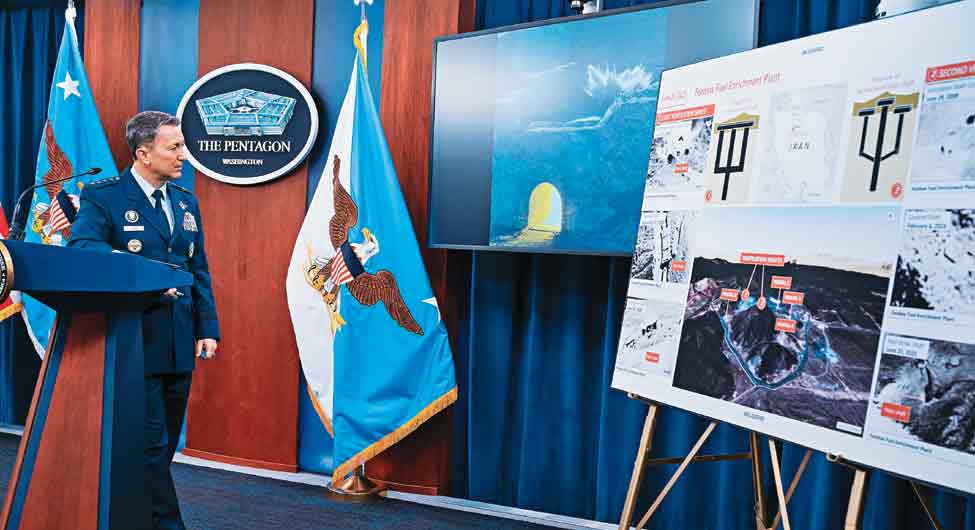It is not just strange that the US bombed the same atomic bases in Iran, whose joint comprehensive action plan (JCPOA) agreement was unilateral in 2018. Most experts and diplomats from all over the world have described it as legal and diplomatically illegitimate. Iran was then following the terms of JCPOA, but Donald Trump broke the agreement in the first term. Then, imposed sanctions against Iran renewed and began to create “heavy pressure” against it.
Is it not strange now that America bombs on one side and is demanding diplomatic dialogue on the other side. Trump told reporters on 26 June during the NATO summit, “Iran is to be talked to next week.”
It is not just to deny immoral or balanced attitude, but it is also a violation of international laws. Under Article 2 (4) and 51 of the United Nations Charter, there is a ban on military action without permission from self -defense or United Nations Security Council. Article 2 (4) is the basic principle of international law, restricting or threatening military action against the geographical territory of any country or its political freedom.
According to Article 51, the condition of self -defense action against any country is that the first “armed attack” had occurred. In the case of Iran, both these conditions have been vigorously violated, as Iran and later the US attacked, while Iran retaliated.
Under the United Nations Charter, even if self -defense has been claimed for the attack, its ability and loss will have to be fulfilled. This condition was also not fulfilled. If Iran has been continuously refusing to develop nuclear weapons, it would be impossible for Israel and America to defend attacks without enough evidence.
Protest: People burning the flags of America and Israel in Tehran
Ijrael often claims to attack the latter threat against his neighbors, this claim is also controversial under international law.
According to the rule known as Jas Ed Bellm, whether Iran or America feels that Iran will have to follow the appropriate conditions for any action, even if Iran hijbullah or the so-called non-settled groups like Hezbollah or huts. The same applies to Iran in the case of attacks in Syria or other places.
As far as ruling is the case, the US is probably bound by domestic obstacles that limit the government’s ability to take military action against any country including Iran. Although the compulsory approval of the Congress or the House of Representatives for such actions has also been ignored, the previous US governments have also ignored, but this allegation has emerged here again. Some MPs have given notice of impeachment against Trump on this issue in his upper house Sinet, in which Democrat Burney Senders are prominent. This has also become big in the current era because many big Magas (Make America Great Again) supporters are openly against the war in the Republican party of Trump.
In addition, Iran has the right to peaceful use of nuclear power as a signator of the Nuclear Non -Proliferation Treaty (NPT).
The US exited the JCPOA agreement in 2015 during the Barack Obama administration under the Trump Administration and re -imposed a strict ban against Iran. This also affected the intentions of Western powers to limit Iran’s nuclear program. After that, Iran refused to accept the new terms of America, which is being seen as a reason for the US attack.
The questions presented to America after attacking Iran are known: Do Iran have weapons of mass destruction? Was he preparing to use it? Is there any reliable proof? These questions will be reminiscent of the world of America’s attack in Iraq, which was justified with the claim that Iraq has chemical and nuclear weapons which are a threat to the world. This claim turned out to be completely baseless.
In addition, the principle of prevention of a country from military attacks on another country is not new, nor has it started with the United Nations. Earlier in 1919, the League of Nations gathering ordered members to honor the regional integrity of all members against the external invasion.
During that time, disputes between nations were to be resolved by arbitration actions, or to be resolved judicial, or to be sent to the League Council, and strict conditions were imposed on the war before reaching an agreement or before being failed or impossible.
The League of Nations carried forward the collective safety theory, which the United Nations Security Council also adopts, but unlike UNSC, the League of Nations could not implement it, nor stop the war. The United Nations Charter was a very strong system, especially Article 2 (4) and Article 51, which together forms the Jas Ed Belum system.
However, the UNSC system is currently stuck in veto power, under which the US, Britain, Russia and China may stop the proposal against the action of ceasefire, ban, investigation and dominance.
In addition, the UNSC made concrete decisions in some cases and implemented but not in some cases. For example, in 1990 in Iraq, but not in Rwanda in 1994, and of course not in 2023. This accused him of adopting a double attitude. These districts have reduced the validity of the international norms implemented by the Security Council. In addition, the Security Council is often paralyzed when the case is of P5 ie five permanent members associate countries, such as the Syrian civil war, the Ijrael-Phalistine conflict and the Ukraine War. In all these cases, Russia, America and Russia had veto respectively.
